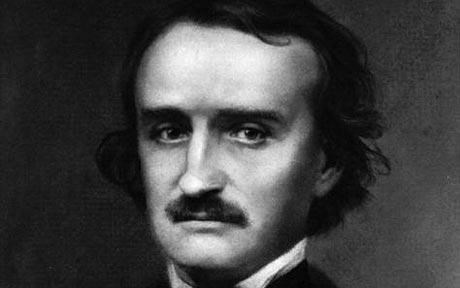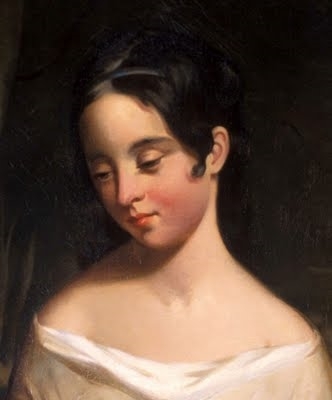 |
| Edgar Allan Poe (http://i.telegraph.co.uk/telegraph/multimedia/archive/01498/poeEdgar_Allan_Poe_1498622c.jpg) |
Why is it that people always assume that dark minds are insane? Edgar Allan Poe is remembered for his dark, creepy, twisted tales and poems. Many people believed that because Poe came up with such poems, he, like the subjects in his stories, was insane. However, these macabre tales showed just how much Poe understood the world around him. While writing these stories Poe began to understand not only the human mind, but also the world and universe that surrounded him. It took a long time for people to understand the world and its inhabitants the way Edgar Allan Poe did.
 |
| Edgar's wife Virginia, painted by Thomas Sully (http://3.bp.blogspot.com/_CvDCiEFbNy8/Ssymmom-XOI/AAAAAAAALpU/tu-wVV15bXs/s400/Thomas+Sully+Virginia+Clemm+Poe.jpg) |
On January 19, 1809 Edgar Allan Poe was born, the middle child of three children to two traveling actors. In 1811 both his parents died of tuberculosis leaving him and his siblings to be divided amongst foster parents. Years later he had an argument with his foster father and dropped out of the University of Virginia, the college he attended, and moved to Baltimore to stay with relatives (Wilson). In 1827 he joined the military under the name Edgar A. Perry and published his first book of poetry. After his foster mother’s death in 1829 Poe attempted to get himself kicked out of the military, and succeeded. In 1836 he married his cousin Virginia Clemm. In 1838 he published his first novel (Nate Gillespie and David Siminoff). Then in 1842 tragedy struck; while Virginia was singing at the piano she began to bleed from the mouth, a sign of untreated tuberculosis. Poe moved to New York and took over The Broadway Journal, where he first published his work The Raven, but unfortunately the journal failed in 1846 (Nate Gillespie and David Siminoff). The next year Virginia couldn’t hold on any longer and she died, leaving Poe a terribly depressed man. Poe became an alcoholic and died three years after his beloved Virginia (Nate Gillespie and David Siminoff).
 |
| A book full of Poe's many works (http://images.alibris.com/isbn/0/3/8/5/0/0385074077.gif) |
The Tell-Tale Heart, The Raven, and The Black Cat are all works in which Poe demonstrated his understanding of human psychology. In all of the listed works the main character falls ill to his own insanity. In the second paragraph of The Tell-Tale Heart the narrator explains why he made his decision to kill an old man he loved: “I think it was his eye! Yes, it was this! He had the eye of a vulture - a pale blue eye, with a film over it. Whenever it fell upon me, my blood ran cold; and so by degrees - very gradually - I made up my mind to take the life of the old man, and thus rid myself of the eye forever” (Poe, 1843). The man was haunted by the ghostly eye and decided to kill the old man, but through the entire story he claims he is not insane because he committed the crime with such precision, so calmly he simply could not be insane. However, in the end the man cannot stand his own guilt and turns himself in. Poe explores the insanity of the man to the point where he thinks of the motive, the guilt, and how the man is so insane he does not know he is insane. In The Black Cat a man is haunted by a cat that eventually uncovers the wife he murdered to the police. Again Poe explores the psyche of the person to the point he thinks of motive, a life story, and how the man feels afterward. He digs into the details of the human mind in order to understand humanity itself. In the days Poe lived people didn’t look into the minds of the ‘insane’ to find out what was truly happening. One cannot understand humanity without understanding all aspects of humanity. Because of these stories in which Poe gave others the opportunity to understand the human mind, Poe became dubbed insane instead of genius. His understanding of the very details of the human mind that no one else dared to comprehend led him to understand the world.
Poets describe things that aren’t always realistic to be metaphorical, but when Poe wrote Eureka in 1848 he wasn’t making a metaphor. He was contemplating relativity, chemical affinity, other universes, black holes, the planetary structure of an atom, and molecular structures. "I design to speak of the Physical, Metaphysical and Mathematical—of the Material and Spiritual Universe: - of its Essence, its Origin, its Creation, its Present Condition and its Destiny" (G.). Poe scribbled out these words a year after his wife’s death in a sort of frenzy. They explained the purpose of Eureka; to record his observations of the world around him. Poe talked about several things in this book that weren’t officially discovered for years. Relativity, for example, was credited to Einstein in 1905, yet Poe was writing about it in 1848 (G.). He also wrote about chemical affinity which wasn’t understood in the details Poe understood it until 1917 (G.). It is not possible that Poe's writings could have been influenced by the discoveries of others because the time gap was too large for him to have been able to confer with the official finders of such things (G.). These discoveries were indeed his own. Considering he had more primitive and less efficient equipment than the scientist who later made the same discoveries, Poe’s work is truly impressive. He applied the same method he used to explain the universe as he did the human mind. He thought of a reason something does what it does, the way it completes these actions, and the results of the completed action. He explored the world all the way down to a tiny molecule and all the way into space and galaxies beyond our own. Eureka stands as a recording of Poe’s scientific findings.
Edgar Allan Poe is an inspiration because he went beyond the limits of others at the time. He looked into the details of the mind and universe in order to understand how everything around him functioned. He brilliantly figured out science and psychology. He contemplated things too far away for most minds to think about during his time. He left records of his findings in his books and poems for everyone to read. Just by picking up one of his works you can think about what top scientists think about every day. What Poe gave people as a glimpse of the world they read as entertainment instead of as a source of learning. Even Eureka wasn’t appreciated as a scientific journal because Poe was a writer, not a scientist. The work was cast aside and ignored and the profound discoveries of Poe were credited to other great scientific minds. Despite the ignorance of his readers, Poe was still a great philosopher for reading into all the details of the world and people around him.
Baltimore, E. A. (n.d.). The Broadway Journal (New York, NY). Retrieved January 28, 2010, from http://www.eapoe.org/: http://www.eapoe.org/Works/editions/mbj001.htm
G., J. L. (n.d.). Edgar Allan Poe and Science: A Cosmic Poet. Retrieved January 25, 2010, from www.poedecoder.com: http://www.poedecoder.com/essays/lartigue/
Nate Gillespie and David Siminoff. (n.d.). Edgar Allan Poe Timeline. Retrieved January 26, 2010, from www.shmoop.com: http://www.shmoop.com/poe/timeline.html
Poe, E. A. (1843). The Tall-Tale Heart. Retrieved Febuary 2, 2010, from www.poedecoder.com: http://www.poedecoder.com/Qrisse/works/tth.php
Poe's Fame. (2006, Feburary 18). Retrieved January 28, 2010, from Precisely Poe: http://www.poedecoder.com/PreciselyPoe/ Wilson, J. S. (n.d.). Poe's Life. Retrieved January 26, 2010, from www.poemuseum.org: http://www.poemuseum.org/
Page created on 10/21/2010 12:00:00 AM
Last edited 1/6/2017 7:27:47 PM
